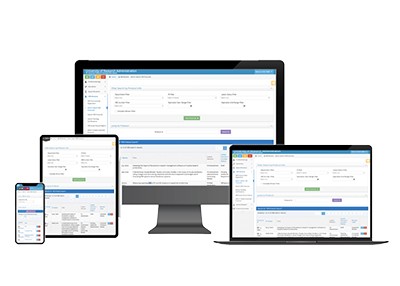IMPORTANT INFORMATION AND REVISION NOTES
This solicitation separates out and focuses on the third project class from solicitation NSF 22-574 Training-based Workforce Development for Advanced Cyberinfrastructure (CyberTraining). The solicitation goals and solicitation specific criteria have been clarified herein.
Any proposal submitted in response to this solicitation should be submitted in accordance with the NSF Proposal & Award Policies & Procedures Guide (PAPPG) that is in effect for the relevant due date to which the proposal is being submitted. The NSF PAPPG is regularly revised and it is the responsibility of the proposer to ensure that the proposal meets the requirements specified in this solicitation and the applicable version of the PAPPG. Submitting a proposal prior to a specified deadline does not negate this requirement.
Synopsis.
The overarching goal of this solicitation is to democratize access to NSF’s advanced cyberinfrastructure (CI) ecosystem and ensure fair and equitable access to resources, services, and expertise by strengthening how Cyberinfrastructure Professionals (CIP) function in this ecosystem. It aims to achieve this by (1) deepening the integration of CIPs into the research enterprise, and (2) fostering innovative and scalable education, training, and development of instructional materials, to address emerging needs and unresolved bottlenecks in CIP workforce development. Specifically, this solicitation seeks to nurture, grow and recognize the national CIP [1] workforce that is essential for creating, utilizing and supporting advanced CI to enable and potentially transform fundamental science and engineering (S&E) research and education and contribute to the Nation's overall economic competitiveness and security. Together, the principal investigators (PIs), technology platforms, tools, and expert CIP workforce supported by this solicitation operate as an interdependent ecosystem wherein S&E research and education thrive. This solicitation will support NSF’s advanced CI ecosystem with a scalable, agile, diverse, and sustainable network of CIPs that can ensure broad adoption of advanced CI resources and expert services including platforms, tools, methods, software, data, and networks for research communities, to catalyze major research advances, and to enhance researchers' abilities to lead the development of new CI.
The SCIPE program is led by the Office of Advanced Cyberinfrastructure (OAC) in the Directorate for Computer and Information Science and Engineering (CISE) and has participation from other NSF directorates/divisions, as described in Section II. Program Description, Programmatic Areas of Interest. Not all directorates/divisions are participating at the same level, and some have specific research and education priorities. The appropriate contact for the SCIPE program in any directorate/division is the Cognizant Program Officer (PO) for the respective directorate/division/office/program listed below.
All projects are expected to clearly articulate how they address essential community needs, will provide resources that will be widely available to and usable by the research community, and will broaden participation from underrepresented groups. Prospective PIs are strongly encouraged to contact the Cognizant Program Officers in CISE/OAC and in the participating directorate/division relevant to the proposal to ascertain whether the focus and budget of their proposed activities are appropriate for this solicitation. Such consultations should be completed at least one month before the submission deadline. PIs should include the names of the Cognizant Program Officers consulted in a Single Copy Document as described in Section V.A. Proposal Preparation Instructions. The intent of the SCIPE program is to encourage collaboration between CI and S&E domain disciplines. (For this purpose, units of CISE other than OAC are considered domain disciplines.) To ensure relevance to community needs and to facilitate adoption, those proposals of interest to one or more domain divisions must include at least one PI/co-PI with expertise relevant to the targeted research discipline. All proposals shall include at least one PI/co-PI with expertise pertinent to OAC.
Prospective PIs contemplating submissions that primarily target communities relevant to directorates/divisions that are not participating in this solicitation are directed to explore instead the education and workforce development programs of the respective directorates/divisions.
[1] CI Professionals refers to the community of individuals who provide a broad spectrum of skills and expertise to the scientific and engineering research enterprise by inventing, developing, deploying and/or supporting research CI and CI users. Examples of CI Professionals include CI system administrators, CI research support staff, CI research software engineers, data curators, and CI facilitators, and may also include computational research scientists and engineers who are not in traditional academic paths. See: Transforming Science Through Cyberinfrastructure: NSF’s Blueprint for Cyberinfrastructure Learning and Workforce Development, https://www.nsf.gov/cise/oac/vision/blueprint-2019/CI-LWD.pdf.
Program Solicitation: 23-521
Eligibility.
Who May Serve as PI:
To ensure relevance to community needs and to facilitate adoption, those proposals of interest to one or more domain divisions must include at least one PI/co-PI with expertise relevant to the targeted research discipline. All proposals shall include at least one PI/co-PI with expertise relevant to OAC.
Limit on Number of Proposals per Organization: 1
Institutions are limited to one SCIPE proposal per competition. In the event that an institution exceeds this limit, proposals will be accepted based on earliest date and time of proposal submission, i.e., the first proposal will be accepted, and the remainder will be returned without review. No exceptions will be made.
Limit on Number of Proposals per PI or co-PI: 1
An individual may serve as PI, co-PI, or other senior personnel on only one SCIPE proposal per competition. In the event that an individual exceeds this limit, proposals will be accepted based on earliest date and time of proposal submission, i.e., the first proposal will be accepted, and the remainder will be returned without review. No exceptions will be made.
Internal Proposals. Interested applicants are invited to submit a 2 page concept paper addressing the elements required for a Proposal as listed in the solicitation - Now Closed
Deadlines. Internal proposals are due by 12/1/23 at 5pm. Internal competition decisions are targeted by mid-December. If unfilled, proposals will be considered on a first come, first served basis. Full proposals to the NSF are due January 18, 2024.




